

About the McConvilles
The Children of James and Jane McConville:
A Pioneer Family
by Madge Y. Kelly
Note: All rights to this work are reserved by the author, Madge Y. Kelly.
"By his deeds they knew him, gone and won’t be back."
HENRY McCONVILLE
1831-1903
Henry is said to have been born in Belfast, in 1831. His brothers and sisters were born in the Tullylish and Ballynagarrick area, near Laurencetown, County Down. Henry was married in County Down,
Ireland to Anne Murphy, who was a few years younger than him. There is no information on her family.
Their first child Patrick (John) was baptised on 14th March, 1855 in Tullylish Parish. His aunt, Mary McConville, was one of his sponsors. Henry, Anne and their son Patrick (John) migrated to South Australia. They were the
first of the family to migrate.
They sailed from Liverpool on board the 1136 ton, three-masted ship "Bucephalis", on 7th July 1855. The "Bucephalis" was built in Quebec in 1854. The Ships Captain was Betts Thompson.
They arrived at Port Adelaide on 13th October 1855. The Colony at this time was in its 19th year. Their luggage was taken from Port Adelaide by bullock-dray whilst they and other passengers walked to the town of Adelaide.
They traveled to the Mid North of South Australia. Henry obtained employment on Kanyaka Station, North of Port Augusta. They lived in a tent in very primitive conditions. Water was available from a well 60 feet deep and not very fresh.
The water was drawn up with a bucket and windlass.
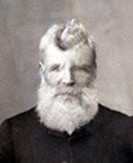 |
Henry McConville in the early 1890's |
In 1856 Henry and Anne started out on their own account and moved to Partacoona, an isolated pastoral station, where they built a wattle, daub and pine slab hut. Henry took on travelling, as a "hawker", in a horse drawn van.
Anne was left alone with the children much of the time. While he was away on one of his trips, their eldest son Patrick (John), then a young child of around 16 months took ill. They also had a young baby, Henry, only 3 months old.
With no doctors or neighbors to help, Anne sent a native with a message to Henry to hurry home. When he arrived, he was too late, their young son had died. This was the first of many tragedies the family were to encounter.
Their business did well, but after a visit to Kanyaka one day, they returned to find their home had been destroyed by fire with only the chimney left standing. The chimney, of their first home, was still there in the 1940's.
Everything was lost except the clothes they wore. They had to start again.
A few years of comparative comfort passed and then sickness came again to the isolated family. Their second son Henry was in need of medical attention. The mail coach passed weekly along the Willochra Plain to Port Augusta,
where the nearest doctor resided. Anne secured a horse on which she placed her side-saddle. The sick child was wrapped and placed in front of her. They travelled many miles to intercept the mail coach, which was running a day late.
She waited at the `mail change'. Unfortunately their second child, Henry, also died. Both Patrick (John) and Henry are in unmarked graves near Kanyaka Station.
Henry had a storekeeper's licence, renewed in 1861 and 1862, near Kanyaka. In 1864 he took up the lease of Myrtle Springs Station (Mt. Scott) 1864 - 1868. He was the first Lessee of Myrtle Springs, which covered 342 square miles.
He established the property with the help of Aborigines. During this time he had battled through the terrible drought of 1864-1866. In its best year Myrtle Springs carried 13,000 sheep.
R. Cockburn, in his Pastoral Pioneers of South Australia wrote: "Mr. McConville was a man of remarkable courage and determination. Early in his pastoral career at Myrtle Springs and during his absence, the blacks broke into
and robbed the store when only the women folk were at home. With the goodwill of a friendly native Henry tracked and seized one of the marauders at Beltana, tied him to a wagon wheel, and announced that he would shoot the captive at
sundown unless the stolen goods were returned. The natives pleaded for, and secured an armistice until daylight, producing the missing property and the aborigine at the wagon wheel got off with a sound hiding. During one of Henry's
trips carting wool alone from Myrtle Springs to Port Augusta, he fell off the wagon while negotiating a creek. The wheel passed over him, breaking his leg. He broke up a soap box, put his leg in splints and drove his team to the nearest
boundary rider's hut. He was then taken to Port Augusta. A Doctor set his limb and
returning home he found his leg was crooked. On his next visit to Port Augusta he had the Doctor break the leg and reset it, without anaesthetic. Henry and his only surviving son, Henry James McConville unloaded their own wool from the
steamer "Ferret" at Port Adelaide during the famous waterside strike, and came through the ordeal scatheless".
In July 1872, another child, Anne Mary, was stricken with a severe illness. The parents set out for the nearest Doctor at Blinman 80 miles away, in a covered cart. They encountered many difficulties, especially the crossing of flooded creeks,
caused by the phenomenal rains of 1872. Four days later they arrived at Sliding Rock, tired and weary with knocked-up horses and the child too ill to proceed further. The Doctor was still 30 miles away, so Henry made an effort to secure him and
rode to Blinman. On the return journey Henry and the Doctor, both on horses, encountered many flooded crossings, as Sliding Rock Creek snaked around. At one crossing Dr. James Hand Powell and his horse were carried down stream. Henry rescued the
Doctor but one of their horses was swept away and drowned. Henry was left to walk the rest of the distance on foot. His super-human effort was in vain. Anne Mary had passed away. Tragedy had struck again, and they left another unmarked grave, this
time at Sliding Rock.
Henry and Anne, among many others, can be said to be true pioneers of the North. Henry took on a partner, Frederick William Baines with the Mirabuckina run, Myrtle Springs 1868-1873. Henry also took up lease No.1729 of Ideyaka in 1867.
He was one of the original land owners at Sliding Rock on 4th February 1874, when, during the sales he made the final offer of £13/15/-, for lots 26, 34 and 51, and also bought lots 11, 12 and 35 at Beltana on 14th February
1874 for £47. At the new town of Farina he owned 17 lots. Being the biggest landowner of Farina, he was asked to lay the foundation stone for their telegraph office in September 1878. He laid the foundation stone of the Royal Victoria Hotel at Beltana
in November 1878.
The properties leased by Henry McConville at times in the North of South Australia were Lease No. 2427 near Callana 1874 and lease No. 2495 near Farina (106 miles) in 1874. Mount Nor-West, 700 square miles, to which was added Witchelina,
representing another 450-500 square miles. This property was stocked with 24,000 sheep. Henry needed more capital, so he took on a partnership with R.A.Tarlton and Charles Rischbeith, this was to be known as Tarlton, McConville and Co. For a time
they did well but eventually Henry sold his share of Mount Nor-West to Messrs. Tarlton and Rischbieth. He transferred Murrapatirrinna to Killalpaninna Mission in 1899. He held Avondale Station, 130 Square Miles, near Farina from 1889 - 1903. Angepena,
Pastoral Lease No.1678 which he sold in 1903. Artimore, a station property (now ruin), Pastoral Lease No.1653, fourteen miles North-East of Blinman, was one of three properties acquired from the Hon. John Baker by Henry in the 1870's. At one time
Artimore had more than 40,000 sheep but like so many other stations, unreliable rainfall, rabbits and dogs took their toll. Artimore was abandoned in 1903. Henry blamed the mongrel dogs of the aborigines more than the dingoes, for the loss of thousands of
his sheep. Some other properties he had were Dulkaninna, Cowarie and Berlino Run.
When Angepena, Avondale, Dulkaninna, Murrapatirrina and Berlino Run were in full swing as many as 37,000 sheep passed through the shearing sheds. The Banks took Avondale and the Berlino Run not long before Henry died in 1903.
Mining was another adventure for Henry. Henry had an interest in the Great Gladstone Silver Mining Company Ltd., near Yeralina Creek. He also had an interest in the Angepena Treasure Gold Mining Company N.L. In late 1895 he had opened up an
additional store on the gold fields, where he was part owner of a mining lease.
There is a "McConville's Mine", about six miles South from Kanyaka amongst low bald hills. Sections 1424 and 1455. `The lode is on the surface of both sections ran 300 yards North and South, and about 18 inches thick. The Ore, which is
mixed with gossan and felspar, is not continuous, but occurs in patches. A shaft was sunk on the lode to the depth of about three and a half fathoms, and a drive was then carried for five fathoms, Copper Ore being obtained throughout. Nine tons of
Ore have been raised, a sample of which assayed twenty seven and a half per cent. Information from "The Mines of South Australia" by J. B. Austin.
Henry was living at Bay Road, Glenelg, when he sold Angepena for £1000, in March 1903. He said that after all those years in the far north, "I am ruined. I am a poorer man today than when I went into it. There were good industrious men north of
Port Augusta 40 years ago, but I have not known one who has left the country yet with the means to live comfortable in his old age".
Anne died at Avondale Station on 25th August, 1896. She was buried in a lone marked grave, near the homestead at Avondale. She had lived
all of her 41 years in the new Colony in the harsh conditions of the North and been predeceased by six of her seven children.
Henry died on 26th March, 1903 in a restaurant in Rundle Street, Adelaide, just after negotiating a sale.
Henry was buried in the West Terrace Cemetery with his sister Mary Martin/McDonald, and four of his children, in the Martin
Plot E7-71, Catholic Section near the Chapel.
| Henry & Anne’s Children |
Born |
Died |
| Patrick (John) | 14/03/1855 | 15/07/1856 |
| Henry | 26/04/1856 | ??/??/185?* |
| Jane Mary | 15/07/1859 | 31/07/1874 |
| Henry James Aloysius | 03/12/1864 | 10/07/1946 |
| Anne Mary | 26/02/1868 | 20/07/1872 |
| Edith Rose | 14/03/1872 | 30/07/1891 |
| Cecil Charles | 11/08/1876 | 18/11/1876 |
* no death certificate found
A Poem in memory of Henry McConville, by Daniel (Keneally) O’Connell from in his book "Hills of Longing".
BY HIS DEEDS.
By the lone dyke waters, where the soil is dank,
Stands a lowly cottage, dreaming on the bank.
Bolted up the doors are, drawn is the blind,
Guarding close its secrets, sweet and far behind.
Once its doors were open and its window’s gleam
Beckoned to the teamster and his weary team,
Never passed a swagman, never passed a tramp,
But for whom its presence lit a kindly lamp.
Round the log fire glowing, rippling with mirth,
Sat the nomad bagman, rovers of the earth,
Pouring out their stories, gathered from afar,
As they wandered onward ‘neath a lambent star.
Was’nt that life splendid? Wasn’t that life free?
Scent of gum leaves blended with the billy tea.
Handshakes in the morning, ere they face the plain,
Goodbye and God bless you, till we meet again.
Turning then the master of that shanty old
Pondered on the wisdom of the tales they told.
Far they spread his sayings, spread afar the seeds
Of his acts of kindness, of his humble deeds.
But on their returning, after years, the twain
See no candle burning through the window pane,
And no smoke emerging from the chimney stack.
Down they sit, and ponder, "Where is poor old Mac?"
Though they turn the door knob, though they call and rap,
While the storm clouds gather in the Hookina Gap,
Pleading for an entrance, food and rest implore,
Never comes a footstep answering the door.
Isn’t death disarming? Isn’t death a power?
No man’s hand can parry on that fateful hour;
Like the lowly swagman, heading for the plain,
He has gone, but never shall return again.
So they pack their baggage, "sling it," and away,
But their thoughts are turning to a long-gone day,
And the kindly master of the lowly shack,
By his deeds they knew him, gone and won’t be back.
"A Bold Man with a One Shot Musket."
JAMES McCONVILLE
1834-1916
James was born in County Down, Ireland c1834. He was married in County
Down to Ellen Raverty/Rafferty. Ellen’s parents were Daniel Rafferty and
Mary (Helen) Milligan. They also had a daughter Mary Anne.
She was baptised in Tullylish Parish on 24th October 1854 one
of her sponsors was her aunt, Mary McConville.
James and Ellen emigrated to Queensland, Australia. The date of departure
from Plymouth was 25th June, 1855. They left Plymouth on board
the "Conrad" arriving at Moreton Bay, Queensland on the 15th November,
1855. On the Ships passenger list, when they embarked James’s age was
given as 19, Ellen’s was given as 22. The child was about 8/9 months old
on embarkation. The McConville family’s "state of health, strength,
and probable usefulness" to the Colony was given as
"good". James calling was given as labourer.
They traveled by foot and dray and arrived at Pikedale Station near Stanthorpe. James worked as a Shepherd at first. Mary Anne died soon after their arrival. (No death certificate has been found.)
Tradition has it that Mary Anne was buried at Grandchester, Queensland. Their second child Henry was apparently born at Pikedale Station, circa 1856. (No Birth Certificate has been found.)
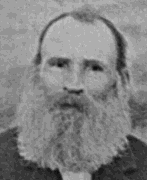 |
James McConville in the early 1900's |
In September 1859 their third child, John, was born at Toowoomba. (No Birth certificate has been found). He died in April 1860 and is buried in the old section of the Warwick Cemetery. James' love
of horses came to the fore and he went to work in Warwick around 1860, for Rev. Glennie as Head Groomsman. They resided at "Rosenthal" during this time. Their fourth child, Edward Patrick, was born
there in 1861.
The longing to own their land was a paramount desire of the early Irish and Scottish Settlers, and James was no exception to this rule. When part of the Leslie Brothers selection at `Canning Downs'
was first thrown open to closer settlement (to be known as the Warwick Agriculture Reserve) James and his friend, Red Wilson were among the first to look over this country. They camped under the stars
and in bad weather under lean-to bark shelters similar to those used by the Aborigines.
They both selected land at Swan Creek in the 1860's. On their selection, James and Ellen established their homestead "Glendyne". Their last child, Ellen Elizabeth was born at "Glendyne" in 1868.
There is a story told of James, by a Mr. Brewer who has quite a knowledge of the early history of the District. During an Aborigine attack on the Brewer home, the Brewer family was close friends and
neighbors of the McConville family. James saved Mr. Brewer's Grandmother and his Father (who was a baby at the time) from certain death at the hands of the Aborigines attacking the Brewer home. James charged
into the mob, on horseback with only a single shot musket to defend himself and the Brewers. This was enough to frighten them away.
James and Ellen lived and farmed in the Warwick District until they died. Ellen died on the 5th October, 1915. She was buried on the 6th October, 1915. James died the following year,
on the 17th February 1916, he was buried on the 19th February. Ellen, James and their son Henry are buried in the McConville plot, Catholic Section, Warwick Cemetery.
| James & Ellen’s Children |
Born |
Died |
| Mary Anne | 24/10/1854* | ??/12/1855 |
| Henry | ??/??/1855 | 24/08/1933 |
| John | ??/09/1859 | 14/04/1860 |
| Edward Patrick | 27/12/1861 | 24/09/1930 |
| Ellen Elizabeth Barrett | 04/08/1868 | 29/10/1915 |
* Baptised Ireland
"Innkeeper on the Northern Frontier."
MARY McCONVILLE
1837-1898
Mary was born at County Down, Ireland in 1837. In 1855 Mary had been Sponsor to her Brother Henry’s child Patrick (John) and to her brother James’ child
Mary Anne. She married Henry Martin in County Down Ireland.
They arrived in South Australia on the "Orient" on 20th. July, 1865. Mary’s sister Sarah McConville came with them on the same ship.
According to the Shipping column, "South Australian Register", dated 21st. July, 1865: The "Orient" ship 1032 tons; John Harris - Master, left from London April 29th via Plymouth May 4th. "Passengers Mr. & Mrs. White,
Mr. Thorold, Mrs. Abernethy & infant, Isabella, George & Eliza Abernethy, Charles Simmons, & Mrs. Corbin in the Cabin; Jas Pitcher, Anne Pawsey, Richard J Davis, Charlotte E. Reynolds, David Waite, Charles Billing, Henry Martin,
Mary Martin, Anne Martin and Sarah McConville in second Cabin".
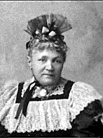 |
Mary (nee McConville) McDonald Martin early 1890's |
They moved North to be near Mary’s brother Henry McConville. Henry Martin
bought blocks of land at Beltana at the same time Henry McConville bought
his land. Henry and Mary had the "Northern Hotel", Port Augusta from
1876 until 1879. They were there when Mary's brother John and his wife
Margaret and family arrived out in 1877 from Ireland. Henry and Mary
sold this hotel in 1879 and then bought the "Transcontinental Hotel"
at the new town of Farina in 1879. Farina was then the Northern most
settlement at the end of the "Ghan" railway line.
Henry died on 15th June 1881 in Adelaide. Henry was 46 years
old. He is buried in the Martin Plot, Catholic section, West Terrace
Cemetery. His estate was sworn to be under £1983.0.0.
Mary carried on managing the hotel at Farina and also had property in
Edward Street, Norwood and at Burnside, both Suburbs of Adelaide, and many
blocks of land in the new town of Farina. She also had a number of blocks
in the towns of Quorn and Port Augusta.
She married again to Ronald (Ranald) Ewan McDonald on 18th
June, 1885, in St Patrick's Church, Adelaide. Father Michael O'Sullivan
was the celebrant, witnesses were W.A.C. Johnson, Adelaide, and F.A.
Fitzgerald. Ronald was the son of Alexander McDonald and Mary, nee Campbell.
Ronald was born in Adelaide on 15th November, 1846. He was
Christened on 25th November, 1846 in Adelaide. His occupations
were "hawker" and later, mailman at Blinman and Farina. After their
marriage, he worked with Mary in the Transcontinental Hotel, in
Farina. He is said to have been related to Flora McDonald, the Mother of
Blessed Mother Mary McKillop.
Mary and Ronald spent their time between Burnside and Farina. Mary had
managers running the hotel at Farina between 1893 and when she died 1898.
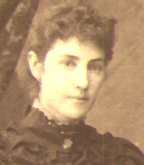 |
Young Jane McConville in the early 1890's |
During her life she cared for and helped educate Jane McConville,
daughter of her brother John. Mary died in Adelaide on 22nd
December, 1898. She was 61 years old when she passed on.
Mary was buried with her first husband Henry in the Martin Plot, Catholic
section, West Terrace Cemetery. Mary's Will which was very extensive was
Proved in the Supreme Court of South Australia on 11th January
1899. Anna Jane, Mary’s daughter, and Jane McConville were the beneficiaries
of Mary’s Will.
Ronald Ewan McDonald went to Queensland and died at the Kennedy Hospital,
Bowen on 9th May, 1934. He was buried on the 10th May,
1934 in the Bowen Cemetery.
Jane McConville, Mary's niece, daughter of John McConville, became the
Licencee "Transcontinental Hotel" from 1898 until 1905 when
she married Thomas H. Dixon and went to live in Western Australia.
| Mary and Henry's Children |
Born |
Died |
| Anne Jane Andrews | ??/??/1857 | 01/12/1934 * |
* died in Goodna, Queensland.
"A Frontier Mother."
SARAH SELINA McCONVILLE
1841-1924
Sarah Selina was born in County Down, Ireland around 1841. She arrived in
South Australia on the "Orient" from London on 20th July 1865.
The "Orient" was a 1032 ton, three-masted ship built in 1853 in London.
The name of this packet ship was adopted by a subsequent owner of the Steamship
Company and the company became famous as Orient Line.
Sarah had travelled out in the same cabin with her sister Mary, her
brother-in-law Henry Martin and niece Anne.
When she arrived, she went North to the area where her brother Henry
McConville lived. She was the third daughter to James and Jane,
according to a Newspaper Notice of her Marriage. At the age of 28 years,
she married Edwin Arthur Stocks on 5th August, 1869, at
Willochra, S.A. Witnesses at the wedding were her brother Henry McConville
and Jessie McGee. Edwin was the son of Benjamin Stocks and Marrianne,
nee Dutton. Edwin was born in England in 1835.
Sarah and Edwin had a store at Willochra.
Edwin died of Pneumonia, at Port Augusta hospital on 15th
June, 1891, aged 56 years. He is buried in the Port Augusta Cemetery.
Sarah died of heart failure at Beachport, in the South East of S.A., on
23rd February, 1924 aged 85 years. She was buried by Rev. Father
Gatzmeyer in the Catholic section of the Millicent Cemetery.
| Sarah and Edwin's Children |
Born |
Died |
| Ernest Henry | 11/09/1870 | 28/22/1951 |
| Edwin Arthur | 06/08/1871 | 07/08/1927 |
| Benjamin James | 02/08/1873 | ??/??/1964 |
| Sarah Selina Braun Hannah | 20/07/1875 | 24/12/1964 |
| Annie Mary Pyne | 09/10/1876 | 07/02/1948 |
| Frederick William | 15/05/1878 | 31/01/1879 |
| Emily Jane Barry | 16/07/1880 | 05/05/1973 |
| Joseph Dutton | 14/06/1882 | 04/08/1882 |
| Marrianne Brown | 19/07/1884 | 10/06/1979 |
"A Girl for the Gold Fields"
JANE McCONVILLE
1845-1922
Jane was born at Balynagarrick, County Down, Ireland in c1845. She
emigrated to Australia on the ship "Golden Empire". On the Ships
passenger list Jane’s age was given as 18 years. She was a spinster.
The "Golden Empire" was owned by T. M. McKay & Co. - the
Black Ball Line of Liverpool. The line, formerly the Royal Mail Packets,
set records for the run between Britain and Australia with it's fast sailing
clipper ships, some built by the famous Donald McKay. The Master was D. M.
Goodall. There were 366 "statute adults" excluding cabin
passengers. ‘Aggregate number of superficial feet in the compartment,
set apart for passengers, other then cabin passengers was 5490’.
The Port of embarkation was Queenstown (now known as the city of Cork with
it's island port at Cobh), in the south of Ireland. The destination was
Brisbane. The Ship was scheduled to depart 13th April, 1863,
the journey was to take 140 days. The ship arrived on 23rd
July, 1863.
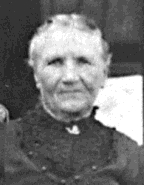 |
Jane (nee McConville) Jones around 1920 |
When she arrived in Brisbane, her brother James, met her. He rode to Brisbane with a spare horse and brought her back to Swan Creek, near Warwick.
She had never ridden a horse before and the distance she had to travel was approximately 140 miles.
Jane married Frederic(k) Jones on 30th September, 1867 at Warwick, Qld. She was 22 years old. Her occupation was given as Servant. Frederic was 25 years. His occupation was Storekeeper. He was born at Manchester, Lancashire c1842. His parents
names were Edward Jones and Jane, nee Appleton. His father's Profession was given as Commission Agent. (The spelling of McConville on their marriage certificate was McConvill). On the records it is shown also as McConnell.
Frederick died at Warwick in 1885. He is buried in the Warwick Cemetery.
Jane went to the Gympie gold fields after Frederick died. She had many great tales of her experiences in the gold fields.
She married John Lyons of Gladfield. There were no children to this Marriage. John died on 28th November 1915. He was buried in the Warwick Cemetery on 29th November.
Jane died on 18th March, 1922. She was buried in the Warwick Cemetery on 19th March, 1922.
| Frederic & Jane’s Children |
Born |
Died |
| James Edward | 22/06/1868 | ??/11/1940 |
| Anne Florence Frank | * | ??/??/1870 |
| Elizabeth | 29/04/1872 | ??/10/1873 |
| John Henry | 11/04/1874 | 17/03/1886 |
| Frederick Joseph | 13/04/1876 | 23/09/1959 |
| Ernest Herbert | 24/05/1879 | 06/12/1902 |
| Ellen Ethel Margaret (twin) | 25/11/1881 | 06/12/1881 |
| Louisa May (twin) | 25/11/1881 | 21/12/1881 |
| William Sydman | 02/05/1883 | 21/10/1948 |
| Mabel Dwyer | 16/02/1885 | |
* Born at Tenterfield,NSW.
"The Last of the Pioneers of Quorn"
JOHN McCONVILLE
1848-1941
John was born in County Down. He was christened on 3rd. June, 1848 at Tullylish, Laurencetown, County Down. This was the date he always celebrated as his birthday. His Godparent was Bella Heenan.
He was about two years old when his mother died. His young brother Patrick was born about that time.
In 1869, at about the age of 21, John sailed for America. He got a job moving houses. John said "you could be inside and they could move the house elsewhere", they could move them so quickly.
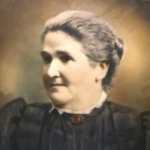 |
Margaret McConville 1918 |
It was whilst he was on a job moving a house, he stepped outside and he saw Margaret McKeown, a young lass from his home town back in Ireland, coming along the street. She had sailed for America from Ireland in May 1870.
He stepped out and made a great fuss of her and renewed their acquaintance. This was the beginning of their courtship.
Margaret was the daughter of John and Mary McKeown, nee McCusker. She was Baptised in Tullylish Parish, County Down, Ireland on 2nd May, 1847.
Tradition has it that John McKeown worked in the cotton industry and became crippled with Arthritis due to the dampness. Mary McKeown died when Margaret was about 8 years old. Margaret lost contact with her family. She heard
later that her only sister had died around 1877, after Margaret and John had moved to Australia. Margaret had three brothers. Thomas, Margaret's favourite brother died at about the age of 16, after being beaten up the evening before
the Ulster day march.
John and Margaret were married in Patterson Town, New Jersey on 31st March, 1872. John used to say he got married on borrowed money, much to Margarets' disgust. He had apparently borrowed money from a cousin. They
also said they got married on April fools day, close enough, but American records show the date as 31st. of March. Their name on the marriage record is spelt McConnell. They apparently became American citizens.
Whilst in America John worked as an ice-cutter up on the Great Lakes. He also worked as a Lamplighter in New York. He would walk 15 miles a day to turn the gas jets on and off. He was a very tall man so this job would have been easy
for him. They had three children born in America. One, Mary, died at an early age.
John and Margaret left America and returned to Ireland in May 1877. There they stayed with John's stepmother for a short while. His father had died. They sailed from Plymouth in August 1877 on the "Queen of Nations",
arriving in Port Adelaide on 4th December, 1877. Another child, Mary, was born on board the ship during the long voyage. They sailed up the gulf to Port Augusta arriving there 7 days later on 11th December, 1877.
The ship's record showed ‘the McConville family were of good behaviour’.
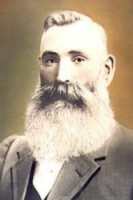 |
John McConville 1918 |
John's sister and Brother-in-law, Mary and Henry Martin, were living in Port Augusta and had the "Northern Hotel" in Port Augusta. At first John became the "boots" boy, but decided "he hadn't travelled thousands of miles to
clean any mans boots" so Margaret took on the work. John got various other jobs. He used to chuckle over the a story of having been commissioned to deliver a message to a settler some distance beyond Stirling North, and the surprise expressed
regarding him not having taken the buggy. To him, after his tramp of 15 miles a day to turn the gas jets on and off in New York, a short stroll such as that did not seem to warrant the harnessing of a horse.
They remained in Port Augusta for six months. The new District of Quorn was proclaimed in May 1878 and in early June 1878 they moved there.
They were one of the earliest families to move to the District. They were early "Pioneers of the Quorn District".
The town of Quorn was proclaimed in 1883. When John and Margaret moved there, John took on any labouring jobs.
He wasn’t afraid of work. As an early settler, he dug the first grave in Quorn.
Margaret was not happy here in Australia, the hot dry country. She longed to be able to take her family and return to America. However John bought a farm for £2000 about 2 miles from the town of Quorn.
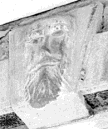
After he bought the farm, they lived in an old temporary building. You could see the stars at night through the roof. This was until the stone home was built in 1889. Twelve months later John their youngest boy was born.
The face on the keystone over the front door was an image of John, done by the builder. He measured John's face and carved it on the stone. In 1988 the house was demolished after being empty for a number of years.
They had their own blacksmith equipment and made a lot of their own farm implements. John, farmed his land. He started a lime burning business, from which he supplied lime for many of the major buildings in Port Augusta, Quorn and the
bridges and culverts on the new Northern Railway North to Oodnadatta and South East to Terowie.
Margaret died in Quorn on 21st. March, 1925. They had a large family and only two of the children, Mary (1) and Jane, predeceased her.
An Obituary in the local paper: Mrs. J. McCONVILLE:
Mrs. John McConville, one of the oldest and respected residents of the Quorn District, died at her residence, Pinkerton, on Saturday last, March 21. Deceased was of a most kindly disposition, and her passing is
regretted by a wide circle of friends. She was born at County Down, North of Ireland on May 2, 1847, and sailed for the United States of America in May, 1870. She married on April 1, 1872, in the State of New Jersey, America,
and returned to Ireland with her husband and two children in May, 1877, and then sailed for Australia from Plymouth in August, 1877, and arrived at Port Adelaide on December 4, 1877, in the ship `Queen of Nations'. She then sailed for
Port Augusta on December 11, 1877, where she remained for six months, and then came to Quorn district, where she resided with her husband and family until her death. Despite her age and prolonged illness Mrs. McConville retained her
faculties until the end. A widower and three sons and five daughters survive, namely,
(Farina), Mrs. T. M. Wilson (Port Pirie), Mrs. M. B. Ryan (Port Pirie), Dominic, Annie, Grace, John, and Florence (Quorn). Another daughter, Mrs. T. H. Dixon, of Caballing, W.A., is dead. There are twelve grand children.
John had land at Pichi Richi and also land for grazing sheep on the Willochra plains, North of Quorn. The property was near the five mile railway crossing North of Quorn. There was an old hut on the property
which was used by people when moving sheep.
In 1933 an article in the Advertiser by Our Travelling Staff Representative, QUORN, September 26. The article's heading was ‘Potential Empire Builders - Far North Breeds Happy Jovial Veterans - Pioneer Stories’.
'True Empire Builder'
`Yesterday morning Mr. Norman Coles took me out to meet Mr. John McConville at his 640 acre farm on the edge of Quorn. The jovial leonine pioneer, who is in his 85th year, accorded us a hearty welcome,
and maintained that he was (6 foot 6 inches in his stockinged feet) only a young fellow yet. We spent an interesting morning listening to Mr. McConville's exploits in this country for more than half a century. He came from Ireland
in 1877, and has certainly played an important part in developing the country, because he was the contractor who supplied the lime for the culverts, cottages, and bridges for the railway from Quorn to Oodnadatta, and to Terowie.
He also supplied the lime for all the big hotels and buildings at Port Augusta.
Before these lines were constructed Mr. McConville recalls having seen at that port, bullock teams extending for half a mile, waiting for stores for all parts of the far north, up as far as Charlotte Waters.
He remembers when Saltia was a busy town, the home of bullock drivers. Now hardly a stone remains.
'Fighting the Droughts'
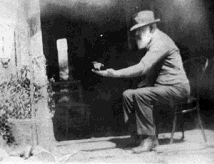
This lovable old man, with a stature like Hercules,
has worked his farm for 44 years. Even the birds are friendly with him.
A minah flew up, perched on his knee, and picked crumbs from his hand.
The landscape now is a verdant picture, and Mr. McConville hopes to
retrieve some of the losses entailed through five gruelling drought years.
When he settled there first it was a forest of heavy
timber, except for 300 to 400 acres of cultivated land. It cost him £3 to
£3. 10 shillings an acre to get that cleared. This year he has 400 acres
cropped, and 200 under fallow, and never has a season looked more bounteous.
Crops have been higher, but feed has never been more plentiful than now.
"I have reaped up to 30 bushels an acre here and have struck seasons when I did not take a machine out of the shed," Mr. McConville said. "For six years I had returns of 500 bags. I was paying £10 a ton for
chaff. It cost me over £1000 to try to keep my stock alive, and then I saved only one team out of the lot. And no return coming in, but yet it is a good country when we get rain," the veteran added with the optimism characteristic
of the far north. The only thing he rails against is the burdensome taxation, which he declares is getting too strong’.
In a local paper on 2nd. June 1939 headed:
'Quorn's Oldest Resident'
‘Oldest resident of Quorn, having lived there for 62 years, pioneer farmer, will be 91 tomorrow. He came to Australia in 1877, reared a family of 11 children, ten of whom are living.
When he took up his farm, the land was a forest, except 300 acres. It cost him £3.10 shillings an acre to clear the balance. Some seasons he has reaped 30 bushels of wheat to the acre; in others he has not taken
the reaper out of the shed. For six years he had a return of 500 bags.
The veteran says, with the characteristic optimism of a pioneer, that, despite adversities, "it is a good country when we get rain.’
In Personal Reminiscences,`The Recorder' by S. W. Osborne headed
`Late Mr. McConville was Lamplighter in New York - Man who dug first grave in Quorn Cemetery':
Well Known Northerner Gone
`The late Mr. John McConville, one of the pioneers of Quorn, who was widely known to and esteemed by northerners generally, passed away at the age of 93 years and six months. During his later years he paid numerous
visits to his daughter, Mrs. M. B. Ryan, of King Street, Solomontown, and his outstanding personality and genial disposition won him the appreciation and respect of a large circle of friends here.
He was the last who, as a man of mature age, made his home in the bush settlement of the 70's which become the well-built and finely laid out provincial town of Quorn. In its development and progress during the past
64 years he played an active and prominent part. That he was early on the scene is indicated by the fact that the first grave in the Quorn Cemetery was dug by him.
In his later years his activities were mainly centred in farming, in which he was assisted by his sons. Altogether he owned about 2,000 acres of land in the district. He possessed a shrewd knowledge of the soil,
and profited by the intelligent experience he had acquired of the weather and general conditions. He was a great believer in the fertility of the North, as indicated by the generous yields he won in favourable seasons, and when reverses,
induced by drought, came he accepted his lot with undiminished courage.
During my brief period at Quorn, after coming to South Australia, I remember him as a hearty, cheerful individual it was always a pleasure to meet, and I soon realised that he and his good wife were two of the
most honoured residents of the district.
I used to see Mr. and Mrs McConville at the fine entertainments arranged by the good Sisters of St. Joseph, and I have a recollection of one juvenile play, "Little Red Riding Hood," in which their daughter
(now Mrs. M. B. RYAN) played a prominent part. I was glad to be able to see that locally she received just press credit for her performance.'
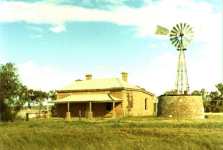 |
The John and Margaret's old homestead in 1980, shortly before being demolished. |
Rumor Of Fifty Bushel Crop
I had much pleasure in renewing association with Mr. McConville just prior to harvest in 1932, when I accepted a kindly invitation from Mr. H. J Cattle to accompany him on a week-end motor trip to Quorn.
On calling at Mr. McConville's residence I found that he had not forgotten me, although 23 years had elapsed since our previous meeting, and I received a warm and hospitable welcome from my old friend.
It was good to note that the stalwart veteran (he stood 6 ft. 6 ins. in his stockinged feet) was then by no means bowed with the weight of years, his fine figure being as straight as that of a soldier on parade.
I jestingly mentioned that I had travelled up specially to see his 50 bushel crop which had been referred to by a section of the Adelaide press. "But that crop was in the paper, not in my paddock", the old gentleman
remarked with a smile.
Still I saw on that occasion - actually for the first time in my experience of that district - beautiful crops on the farms of Messrs. McConville and W. Foster, and many others but unfortunately, they were subsequently ruined by rust.
Mr. McConville had a brother, Henry, who died many years ago. The latter's colorful life and experiences as a squatter, the long list of extensive properties he owned at various times in the North-West and Far North,
and the fluctuations of his fortunes from affluence to penury would provide an epic story such as could rarely be found in the annals of the admittedly precarious pastoral industry of the localities referred to.
I may mention a purchasing commission his pastoralist brother entrusted to Mr. John McConville, one which afforded the latter much amusement. He attended a market at Wilmington at which 6,000 sheep were to be offered, and was generally
taken to be a bush `cockey' whose buying would be likely to be limited to a few ration sheep. When he made a bid he was asked how many he was prepared to take. ‘The lot’, he promptly responded. The news soon went round the ring that the sheep had been
bought on behalf of Mr. Henry McConville, then in his heyday.'
John lived to a good age. The Last of the Pioneers of Quorn. He was 93 years and 6 months old. About three days before he died, he told his daughter, Grace, "Patrick just came, he's grown a big man and
he's getting tired of waiting". Patrick was his young brother who we believe remained in Ireland. John died at 11 am. on the 24th. December, 1941. He was buried in the McConville grave in the Catholic Section, Quorn Cemetery on
Christmas Day 1941.
| John & Margaret's Children |
Born |
Died |
| Mary | ??/??/1872 | ??/??/1875 |
| Jane Dixon** | ??/??/1873 | 08/08/1907 |
| James** | 21/07/1875 | 25/02/1948 |
| Mary (Polly) Wilson | 23/09/1877 | 19/08/1965 |
| Margaret Ryan**** | 10/12/1879 | 28/06/1969 |
| Dominic Ambrose**** | 21/03/1882 | 06/06/1961 |
| Anne (Spinster)**** | 06/06/1884 | 06/10/1969 |
| Grace (Spinster)**** | 01/11/1885 | 23/09/1964 |
| John**** | 27/07/1888 | 01/05/1961 |
| Florence (Spinster)**** | 31/10/1890 | 05/08/1972 |
* Born and died in Patterson, New Jersey.
** Born in Patterson, New Jersey.
*** Born on board ship Queen of Nations
**** Born at Quorn
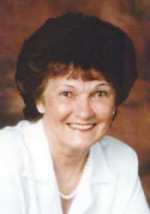
Author's Note: John McConville, son of John and Margaret McConville, was my Grandfather.
He was born at Quorn on 27th July, 1888. He was a farmer and farmed the land in Quorn until 1959.
He died in Port Pirie on 1st May, 1961.
© Copyright Madge Y. Kelly.

Return to Top
McConville History
Annals of the Four Masters
Annals of Ulster
Householders Index
McConville Baptisms Creggan Parish
McConville Marriages Creggan Parish
McConville Baptisms Clonallan & Warrenpoint
McConville Marriages Clonallan & Warrenpoint
The Drumconwell Ogham and its Implications
Letter from the Earl of Moira, Oct. 1796
Edward McConville, an American Hero 1846 - 1899
McConville Index to Griffith's Valuation of Ireland 1848 - 1864











